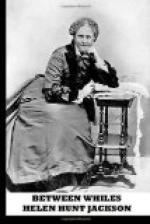“She’s done wonders wi’ ’em,—wonders! I doubt not but it’ll go through as it’s begun. Her face’s a picture to look on. Bless her!” Isabella was saying behind her placid smile.
“Eh, but she’s won her guineas out o’ us,” thought old Dalgetty, ungrudgingly, “and won ’em well.”
“I don’t see why everybody is so afraid of Sandy Bruce,” thought Little Bel. “He looks as kind and as pleased as my own father. I don’t believe he’ll ask any o’ his botherin’ questions.”
What Sandy Bruce thought it would be hard to tell; nearer the truth, probably, to say that his head was in too much of a whirl to think anything. Certain it is that he did not ask any botherin’ questions, but sat, leaning forward on his stout oaken staff, held firmly between his knees, and did not move for the next hour, his eyes resting alternately on the school and on the young teacher, who, now that her first fright was over, was conducting her entertainment with the composure and dignity of an experienced instructor.
The exercises were simple,—declamations, reading of selected compositions, examinations of the principal classes. At short intervals came songs to break the monotony. The first one after the opening chorus was “Banks and Braes of Bonnie Doon.” At the first bars of this Sandy Bruce could not keep silence, but broke into a lone accompaniment in a deep bass voice, untrained but sweet.
“Ah,” thought Little Bel, “what’ll he say to the last one, I wonder?”
When the time came she found out. If she had chosen the arrangement of her music with full knowledge of Sandy Bruce’s preferences, and with the express determination to rouse him to a climax of enthusiasm, she could not have done better.
When the end of the simple programme of recitations and exhibition had been reached, she came forward to the edge of the platform—her cheeks were deep pink now, and her eyes shone with excitement—and said, turning to the trustees and spectators: “We have finished, now, all we have to show for our year’s work, and we will close our entertainment by singing ‘Scots wha ha’ wi’ Wallace bled!’”
“Ay, ay! that wi’ we!” shouted Sandy Bruce, again leaping to his feet; and as the first of the grand chords of that grand old tune rang out full and loud under Little Bel’s firm touch, he strode forward to the piano, and with a kindly nod to her struck in.
With the full force of his deep, bass-like, violoncello notes, gathering up all the others and fusing them into a pealing strain, it was electin’. Everybody sang. Old voices, that had not sung for a quarter of a century or more, joined in. It was a furor: Dalgetty swung his tartan cap, Sandy his hat; handkerchiefs were waved, staves rang on the floor. The children, half frightened in spite of their pleasure, were quieter than their elders.
“Eh, but it was good fun to see the old folks gone crazy for once!” said Archie McLeod, in recounting the scene. “Now, if they’d get that way oftener they’d not be so hard down on us youngsters.”




